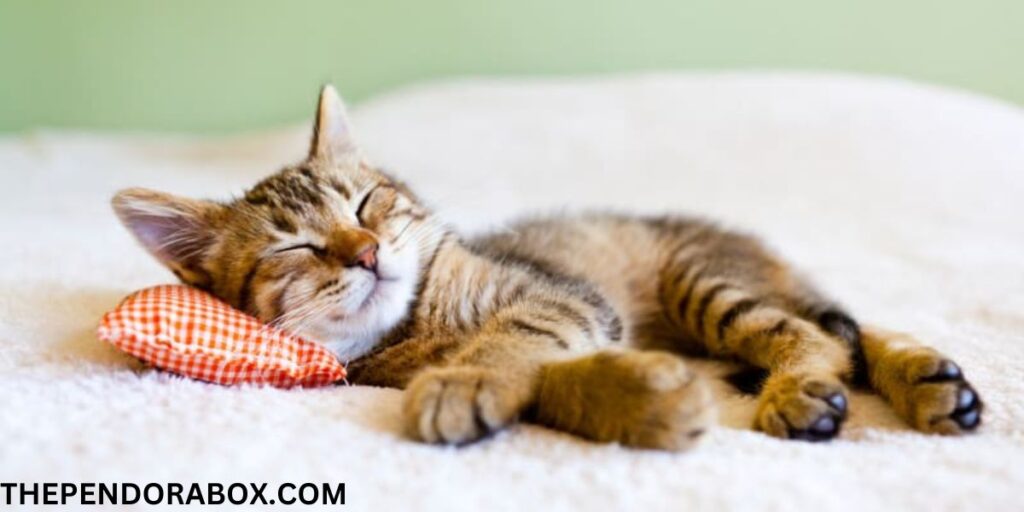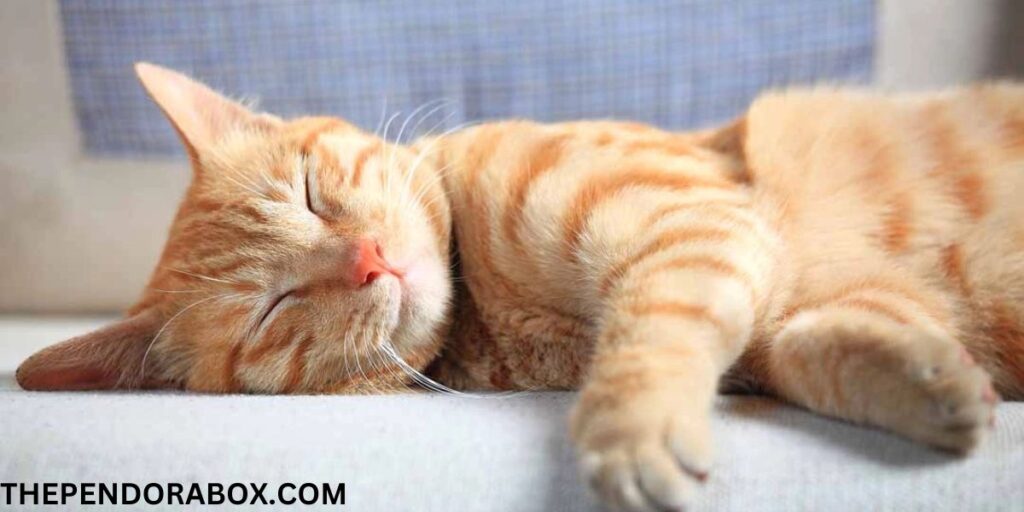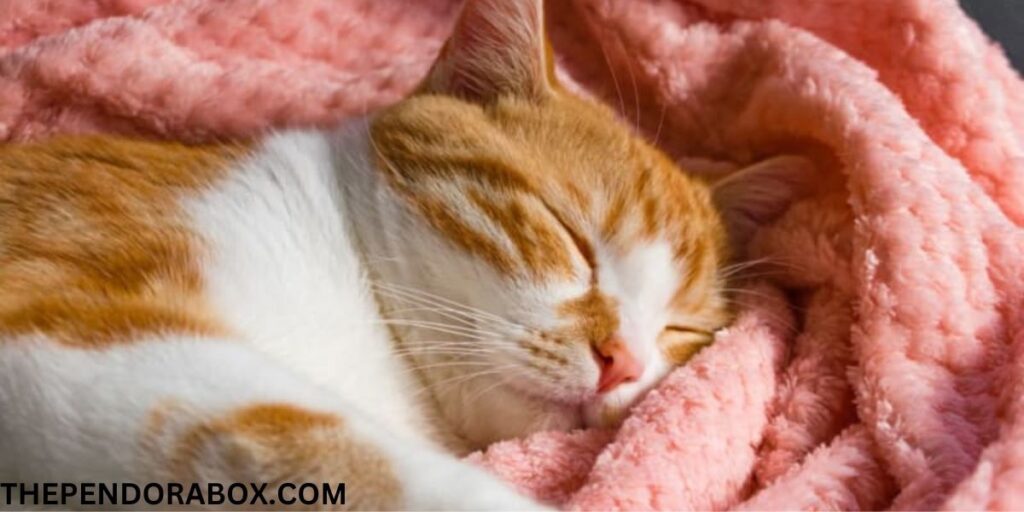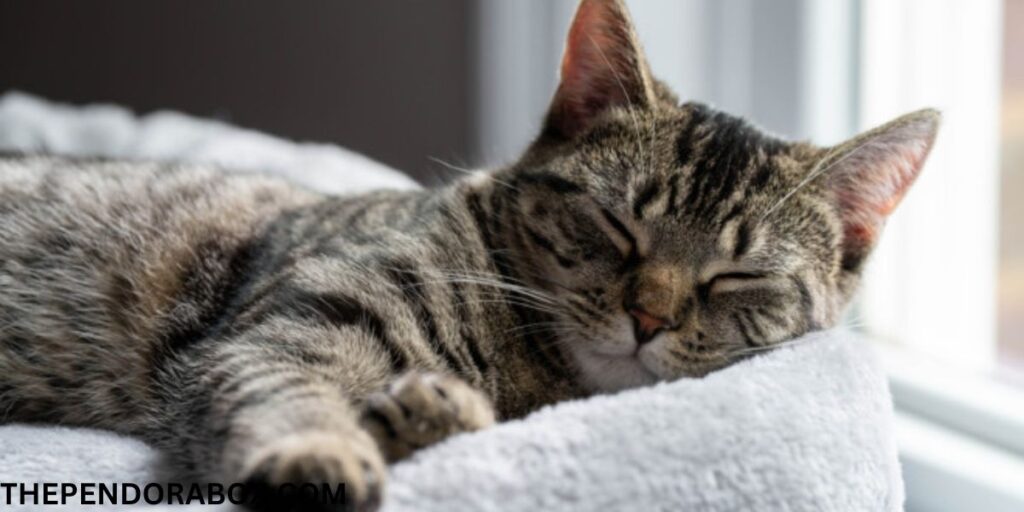Cats are recognised for drowsing a lot, from time to time as much as sixteen hours a day. Their love for long naps comes from their evolution and frame clocks. We’ll dive into the principle reasons why cats sleep a lot and explore their sleep patterns.
The Feline Sleep Cycle
Cats love to sleep a lot, taking lengthy naps at some stage in the day. Their sleep cycle is special, with brief naps unfold out over the day. This isn’t the same as humans, who sleep in a single long stretch.
Understanding Cat Napping Habits
Cats are most energetic at dawn and nightfall. This facilitates them keep strength and live alert for hazard. They take quick naps, from 5 to 30 minutes, with breaks in between.
Polyphasic Sleep Patterns
Cats sleep in a way that switches between light and deep sleep and being wide awake. This lets them live alert and short to reply. They can easily switch from dozing to being equipped to behave.
Having cat snoozing behavior and polyphasic sleep cycles helps cats keep power. It also makes them better hunters. They can rest after which fast chase prey.
Knowing approximately feline sleep styles helps us deal with our cats. It facilitates us create a good sleep area for them.
Evolutionary Adaptations for Survival
Cats want a whole lot of sleep due to their history as predators. They sleep loads to shop energy. This was key for their pussycat survival strategies inside the wild, where looking changed into vital to find meals.
Cats have a special sleep pattern as evolutionary diversifications. It helps them achieve hunting and foraging. They rest plenty to accumulate power. Then, they are able to quick chase prey with speed and agility.
This blend of rest and interest has helped cats survive and thrive for millions of years. By saving strength during rest, they could attention on severe looking. This is important for their survival.
| Evolutionary Adaptation | Benefit for Feline Survival |
|---|---|
| Polyphasic sleep pattern | Allows cats to conserve energy for hunting and foraging |
| Heightened senses and reflexes | Enables cats to detect and react to prey with speed and precision |
| Efficient metabolism | Helps cats maintain optimal physical condition with limited food intake |
These evolutionary adaptations have shaped cats’ sleep patterns and hunting behaviors. They have allowed cats to be successful predators in many environments.

Conserving Energy for Hunting
Cats are amazing creatures with unique sleeping habits. They sleep a lot to save energy for hunting. As crepuscular hunters, they hunt best at dawn and dusk when their prey is active.
Cats as Crepuscular Hunters
Cats sleep most of the day and night to save energy. This lets them focus on hunting when it’s most successful. Their crepuscular hunting helps them catch prey during the twilight hours.
It’s key for cats to save energy for hunting. They need lots of energy to chase, catch, and eat their prey. By sleeping a lot, they build up energy for hunting, making them more likely to succeed.
| Hunting Behavior | Crepuscular Hunting | Energy Conservation |
|---|---|---|
| Prey Availability | Increased activity during dawn and dusk | Cats able to focus efforts on prime hunting times |
| Energy Requirements | Sustained bursts of activity required for hunting | Cats conserve energy through extended sleep periods |
| Hunting Success | Higher success rates during crepuscular hours | Cats able to channel stored energy into hunting efforts |
7 Reasons Why Cats Sleep So Much
Cats love to sleep, often up to 20 hours a day. But why do they sleep so much? Let’s look at the 7 main reasons.
First, cats are most active at dawn and dusk. This fits their hunting habits. They save energy for quick hunts.
Second, cats are built for hunting. They sleep a lot to keep their energy for hunting. This is a key survival skill.
| Reason | Description |
|---|---|
| Crepuscular Hunting | Cats are most active during dawn and dusk, so they sleep to conserve energy for these hunting periods. |
| Energy Conservation | Sleeping allows cats to preserve their stamina and resources for hunting, a key evolutionary adaptation. |
| Circadian Rhythms | Cats’ internal biological clocks influence their sleep-wake cycles, causing them to sleep for long periods. |
| Thermoregulation | Sleeping helps cats regulate their body temperature and conserve energy, especially in colder environments. |
| Hunting Preparation | By sleeping, cats prepare their bodies and minds for the burst of activity required during hunting. |
| Stress Reduction | Sleeping allows cats to rest and reduce stress, which is important for their overall health and well-being. |
| Kittens and Seniors | Younger and older cats have higher sleep requirements due to their developmental or age-related needs. |
Cats’ sleep patterns are also influenced by their circadian rhythms. Their internal clocks are set by light and dark. This makes them sleep a lot during the day.
The 7 reasons for cats’ love of sleep show their amazing adaptations. These adaptations help them survive and thrive. Knowing these reasons helps us understand our cats better.

Feline Circadian Rhythms
Cats are creatures of habit, with sleep-wake cycles tied to their internal clocks. These biological clocks, in sync with natural light and dark, shape their sleep and behavior.
Light and Dark Cycles
Cats are most active at twilight, before sunrise and after sunset. Their circadian rhythms boost their hunting skills in low light, when prey is active.
Exposure to natural light and dark helps cats balance rest and activity. They sleep more during the day and get more alert as the sun sets. This natural rhythm is key to their health and function.
| Sleep Cycle | Duration | Characteristics |
|---|---|---|
| Day Sleep | 12-16 hours | Cats spend the majority of daylight hours sleeping, often in a state of light or deep sleep. |
| Crepuscular Activity | 4-8 hours | Cats become more alert and active during the twilight hours, engaging in hunting, playing, and exploring behaviors. |
| Night Sleep | 2-4 hours | Cats may experience short periods of sleep during the night, but they are generally less active compared to their crepuscular periods. |
Understanding feline circadian rhythms and their link to light and dark is key. It helps create a comfortable, stimulating environment for cats, meeting their natural sleep-wake patterns.
Laziness or Lethargy?
Cats love to sleep a lot, but it’s important to know when it’s too much. While they can sleep up to 20 hours a day, too much sleep might mean they’re sick. This is when you should take them to the vet.
Distinguishing Between Normal and Abnormal Sleep
Cats sleep a lot, but they also wake up to play and eat. If your cat sleeps way more than usual or is hard to wake up, it could be a problem. Normal vs. abnormal sleep in cats depends on their energy, appetite, and how active they are.
A healthy cat is full of energy and playful. But a cat that’s too tired might not want to play or do anything. They might also eat less, groom less, or not respond as well.
If your cat sleeps too much or seems really tired, see a vet. They can find out why and help your cat feel better.
Kitten Sleep Requirements
Kittens sleep a lot more than adult cats. They can sleep up to 20 hours a day. This is because they are growing fast and need lots of rest.
Kittens sleep in short bursts throughout the day. Their sleep is controlled by light and dark. This helps them grow and stay healthy.
It’s important for kittens to get enough sleep. If they don’t, they might feel tired, grumpy, or even grow too slowly. Knowing how much kitten sleep requirements and feline sleep needs are important helps pet owners take good care of their kittens.
Senior Cat Sleep Patterns
As cats get older, their sleep habits change a lot. Senior cats sleep more during the day and have trouble sleeping at night. This is because they have less energy and their minds work slower.
Age-Related Sleep Changes
Older cats can sleep up to 20 hours a day. This is much more than the 12-16 hours they slept when they were younger. They also wake up more at night, finding it hard to stay asleep.
There are many reasons for these changes. Cats move less, think less, and their hormones change with age. All these factors affect how they sleep.
| Sleep Characteristic | Young Cat | Senior Cat |
|---|---|---|
| Total Daily Sleep | 12-16 hours | Up to 20 hours |
| Nighttime Sleep Quality | Consistent, uninterrupted | Fragmented, more frequent waking |
| Daytime Activity Levels | Higher | Lower |
It’s important to understand how senior cats sleep. This helps us take care of them better as they age. By adjusting to their needs, we can make sure they’re happy and comfortable in their golden years.

Indoor vs. Outdoor Cat Sleep
The place where a cat lives greatly affects their sleep. Outdoor cats sleep less because they must stay alert for dangers and prey. Indoor cats, on the other hand, sleep more because they are safe and comfortable.
Outdoor cats face many challenges that disrupt their sleep. They must watch out for predators and competitors. Their hunting and foraging activities also cut into their sleep time.
Indoor cats, however, have a more stable and secure home. They don’t face threats or need to hunt for food. This lets them sleep longer and more soundly. Indoor cats can sleep up to 16 hours a day, while outdoor cats sleep about 12 hours.
The sleep differences between indoor and outdoor cats are key to their health. Knowing these differences helps pet owners create the best environment for their cats. This ensures they get enough rest to stay healthy and happy.
Breed Variations in Sleep Duration
Cats are known for their love of sleep, but the amount they sleep can vary by breed. Some breeds, like the Siamese or Ragdoll, sleep more than others. This is because some breeds are naturally more active, like the Bengal or Abyssinian.
Do Certain Breeds Sleep More?
Several factors can affect a cat’s sleep patterns, including their genes and physical traits. For example, Siamese cats are often more vocal and need more sleep. On the other hand, Abyssinians are very active and curious, spending less time sleeping.
Generally, bigger cat breeds like Maine Coons or Norwegian Forest Cats sleep longer than smaller, more energetic breeds. Their sleep habits are influenced by their evolutionary past as predators. However, breed-specific traits also play a part in how much they sleep.
Consequences of Sleep Deprivation
Not letting cats get enough sleep can harm their health and happiness. Lack of sleep can weaken their immune system and change their behavior. It can even hurt their brain function. It’s very important to make sure cats get enough rest.
Cats without enough sleep are more likely to get sick. They might also become more aggressive, anxious, or tired. Sleep helps cats remember things and learn new things.
It’s key to keep cats sleeping well. Owners should watch how much their cats sleep. This helps keep them healthy and happy. By focusing on their sleep, cats can stay healthy and avoid problems from not sleeping enough.
FAQ
Why do cats sleep so much?
Cats sleep a lot for many reasons. They have evolved to rest a lot to save energy. They also sleep in short naps to stay ready to hunt and defend themselves.
What is the average sleep duration for cats?
Cats usually sleep 12 to 16 hours a day. Kittens and older cats might sleep even more. This helps them stay energized for hunting and being alert.
How do a cat’s sleep patterns differ from humans?
Cats sleep in short naps all day and night. This is different from humans, who sleep in longer periods. Cats’ sleep pattern helps them save energy and react fast to threats.
What factors can influence a cat’s sleep patterns?
Many things can change how a cat sleeps. Their age, breed, and where they live can affect their sleep. Even light and temperature can play a role.
Can a cat’s excessive sleep be a sign of a health issue?
Yes, too much sleep can mean a cat is sick. Watch how much your cat sleeps. If it’s different, talk to a vet.
How can I ensure my cat is getting enough sleep?
Make sure your cat has a cozy place to sleep. Don’t wake them up. Watch how active they are. If you’re worried, ask a vet for advice.
Do certain cat breeds sleep more than others?
Yes, some breeds sleep more than others. Siamese and Ragdoll cats sleep a lot. But Bengal and Abyssinian cats are more active and sleep less.

